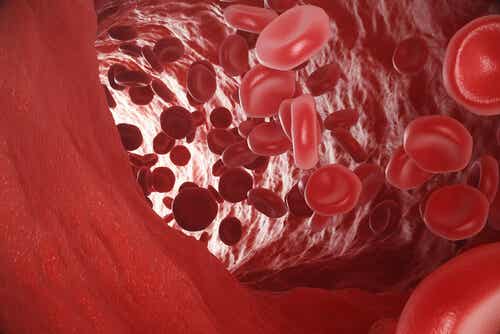Anemia and Weight Loss


Written and verified by the nurse Maria Marin Garcia
There are many causes that can lead to anemia, as well as a multitude of causes that can also lead to weight loss. In addition, there’s a relationship between anemia and weight loss.
There are many different forms of anemia, each with different origins. It can happen temporarily, or last over time, causing it to range from mild to severe.
Like all signs in our body, weight loss can be indicative of a many different illnesses, and it’s important for professionals to rule them out and study them.
In this article, you’ll learn everything you need to know about the relationship between anemia and weight loss.
What is anemia?
Anemia’s defined as the presence of low levels of hemoglobin in our red blood cells. Red blood cells are responsible for oxygen supply because the hemoglobin they contain transports oxygen to the rest of the body.
Hemoglobin is a protein that’s rich in iron, to which oxygen binds for transport. In addition, this substance is what gives our blood its red color. In general terms, normal hemoglobin levels are as follows:
- Women: Geater than 12 grams per deciliter
- Men: Greater than 13 grams per deciliter
As you can see, anemia’s a very common disease in which there’s a deficient amount of hemoglobin. This can mean that our tissues and organs don’t have an adequate supply of oxygen, and that’s where the symptoms come from.

Have a read: The Possible Causes of Unexplained Weight Loss
Symptoms of anemia
Apart from the fact that the symptoms that characterize anemia are specific to the different varieties, it’s important to know that the way anemia appears depends on conditioning factors. These factors are as follows:
- The severity of the anemia
- The speed at which it occurs: The slower it is, the later the signs will appear.
- Your state of health: Anemia isn’t the same in previously healthy people as it is in an oncology patient, for example.
Due to these factors, the symptoms caused by anemia are very unspecific, i.e. they vary greatly from person to person and don’t always repeat. The most characteristic symptoms are:
- Fatigue and weakness
- Shortness of breath
- Dizziness due to hypotension
- Palpitations or tachycardia: In very severe cases, intense chest pain, heart attack, and danger of death may appear if not treated in time
- Paleness of the skin and mucous membranes with cold skin
- Headaches
- Menstrual disturbances
- Loss of libido: Decreased sexual desire, especially in men
- Gastrointestinal symptoms: Lack of appetite, indigestion, or nausea
You may be interested in: Iron-Deficiency Anemia Diet: The Foods to Include
How are anemia and weight loss related?

Knowing the symptoms that anemia causes, we can see that it can involve the gastrointestinal system. A lack of appetite can cause significant weight loss, which, in extreme cases, worsens the person’s state of health. Weight loss can be explained by the lack of absorption of nutrients that are necessary for our body.
Moreover, just as anemia can lead to weight loss, the opposite can also happen: weight loss can lead to anemia. This is explained by not having enough nutrients necessary for the normal functioning of red blood cells.
The main cause of anemia due to weight loss, when food intake decreases, is the deficiency of vitamin B12, iron, and folic acid, which are part of our red blood cells.
Unfortunately, there are countless diseases that lead to weight loss and which are due to multiple causes, thus worsening the anemic condition. An example of this is an intestinal disease that prevents the absorption of vitamins and minerals and ends in pernicious or iron deficiency anemia.
Anemia and weight loss should be studied
There’s a relationship between anemia and weight loss, but they don’t necessarily go hand in hand. On numerous occasions, the appearance of these conditions is a sign of other diseases, the cause of which must be ruled out. When there are signs of anemia or involuntary or excessive weight loss, a detailed study by health professionals is necessary.
All cited sources were thoroughly reviewed by our team to ensure their quality, reliability, currency, and validity. The bibliography of this article was considered reliable and of academic or scientific accuracy.
- Kaushansky K, et al., eds. Folate, cobalamin and megaloblastic anemias. In: Williams Hematology. 9th ed. McGraw-Hill Education; 2016. https://accessmedicine.mhmedical.com. Accessed Oct. 7, 2019
- Ferri FF. Vitamin deficiency (hypovitaminosis). In: Ferri’s Clinical Advisor 2020. Elsevier; 2020. https://www.clinicalkey.com. Accessed Oct. 11, 2019.
- Anemia. National Heart, Lung, and Blood Institute. https://www.nhlbi.nih.gov/health-topics/iron-deficiency-anemia. Accessed July 23, 2019.
- Your guide to anemia. National Heart, Lung, and Blood Institute. https://www.nhlbi.nih.gov/files/docs/public/blood/anemia-yg.pdf. Accessed July 27, 2019.
- Turner, J., Parsi, M., & Badireddy, M. (2023). Anemia. StatPearls Publishing. Consultado el 17 de mayo de 2023. https://www.ncbi.nlm.nih.gov/books/NBK499994/
- Dorelo, R., Méndez, D., Oricchio, M., & Olano, C. (2021). Anemia y patología digestiva. Anales de la Facultad de Medicina, 8(1), e301. http://www.scielo.edu.uy/scielo.php?pid=S2301-12542021000101301&script=sci_arttext
- Asenjo, M. M., Guerra, J. M., Martín, C. R., Muñoz, L. S., Ibañez, M. M., & De Paula, J. P. (2017). Motivo de consulta: pérdida de peso. Medicina De Familia. Semergen, 44(4), 257-261. https://www.elsevier.es/es-revista-medicina-familia-semergen-40-articulo-motivo-consulta-perdida-peso-S1138359317302320
- Valencia, D. C., Erazo, C. R. E., Hilamo, I. C. G., & Carvajal, J. P. (2020). Consideraciones generales para estudiar el síndrome anémico. Revisión descriptiva. Archivos de medicina, 21(1). https://www.redalyc.org/articulo.oa?id=273865670015
- Pérdida involuntaria de peso | Harrison. Principios de Medicina Interna, 20e | AccessMedicina | McGraw Hill Medical. (s. f.). Consultado el 17 de mayo de 2023. https://accessmedicina.mhmedical.com/content.aspx?bookid=2461§ionid=203642256
- World Health Organization: WHO. (2019). Anemia. www.who.int. Consultado el 17 de mayo de 2023. https://www.who.int/es/health-topics/anaemia#tab=tab_1
- Herrera, D., & Bedoya, D. B. (2021). Relación del volumen de agua corporal total, el extracelular, y preeclampsia. Revisión narrativa de la literatura. Médicas UIS, 34(2). https://revistas.uis.edu.co/index.php/revistamedicasuis/article/view/12657
This text is provided for informational purposes only and does not replace consultation with a professional. If in doubt, consult your specialist.








